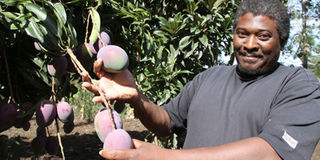Meet the jack of all fruits

Reuben Matthews tending to some of the Mango fruit trees in his farm in Nalepo, Kiserian on March 19, 2014. Photo/ JEFF ANGOTE (NAIROBI)
What you need to know:
- When he is not drilling boreholes in remote corners of the country, Matthews spends time together with his wife, Judy, on their farm, which is earning them a fortune.
- As the manager, she is in charge of their three employees, sales and even goes to Kiserian market herself to sell tomatoes.
- To sustain the farm, the Matthews irrigate the plants all-year round with water from a borehole.
Kiserian resident Reuben Matthews can be aptly described as a jack of all trades when it comes to fruit farming.
Matthews, an American by birth, who, however, insists he is Maasai, is a water engineer, a plumber, hospitality entrepreneur, neighbourhood warden and fruit farmer — all rolled into one. And he performs exceptionally well in all these fields.
“I do so many things that people do not know what I exactly do for a living,” he says with a chuckle.
“If you want to survive, you must do everything,” he adds as he ushers Seeds of Gold into his one-and-three-quarter acre farm that he refers to as the food basket of Kiserian.
When he is not drilling boreholes in remote corners of the country, Matthews spends time together with his wife, Judy, on their farm, which is earning them a fortune.
On a good month, the 16 types of fruits they grow earn them Sh60,000. They sell all the fruits to neighbours, who according to Matthews, prefer his fruits to those sold in supermarkets.
On a bad month, they earn between Sh30,000 and Sh40,000.
“Before I came to Kenya, I had heard stories of it as a country where everything grows and as a lover of fruits, I made up my mind to test this hypothesis,” said Matthews, who arrived in Kenya in 1988 from New Hampshire.
As a child, Matthews developed a passion for farming by watching his father — a preacher in New Hampshire — grow food in their backyard. With time, the passion developed into a fascination until he reached a point where he thought human beings would never survive without farmers and he wanted to be one of them.
“Food does not come from the supermarket; it has to come from a farmer. So why should everyone not be a farmer?” he asked.
Today, his farm has demystified the common notion that some plants are only designed to do well in certain geographical conditions.
Apples, pears, plums, wild cherries, bananas, guavas, cow peas, sukuma wiki, mangoes, pears, nectarine, spinach, straw berries, potatoes, jambolan plums and butternuts all fit in his farm.
When he bought the land in 1993, his first crop was the jambolan plum tree (known in Swahili as zambarau), which he almost cut down after years of waiting without seeing any fruits. Today, it is his second most favourite plant in the farm after wild cherries.
His wife, now the farm manager, is the one who introduced vegetables in the farm, after she realised that fruits are harvested seasonally and the farm had to get money on a regular basis.
“Our neighbours come here, and when they see all these fruits and vegetables, they end up buying almost everything that they think is harvestable. Some put their orders a month before the fruits mature,” she said.
As the manager, she is in charge of their three employees, sales and even goes to Kiserian market herself to sell tomatoes.
“People misunderstand farming by thinking it is a poor man’s means of survival, but they are wrong,” said Judy, who tills or weeds the land herself even though she can afford to hire people to do the job.
“So many people are complaining that they are jobless when they have left acres of land upcountry being wasted by their relatives on maize and beans,” she added. According to her, the reason why so many farmers are still poor is their conservative nature, which has made them over-rely on maize and beans without accessing the market.
“They should stop that. Whatever is not in the market is what they should be planting. When there is no sukuma wiki (kale), plant that.”
To sustain the farm, the Matthews irrigate the plants all-year round with water from a borehole.
The couple are also not afraid to plant new species of plants, insisting that all plants can grow anywhere as long as they are taken care of.
“If you want to look for a family around here to tell you the quality of my fruits and vegetables, make sure you go to all of them,” he joked.
“People here sleep holding money in their hands calling me to store some fruits or vegetables for them,” he added. Apart from the land in Kiserian, the Matthews also own parcels of land in Eldoret and Kisii where they practice commercial farming.




